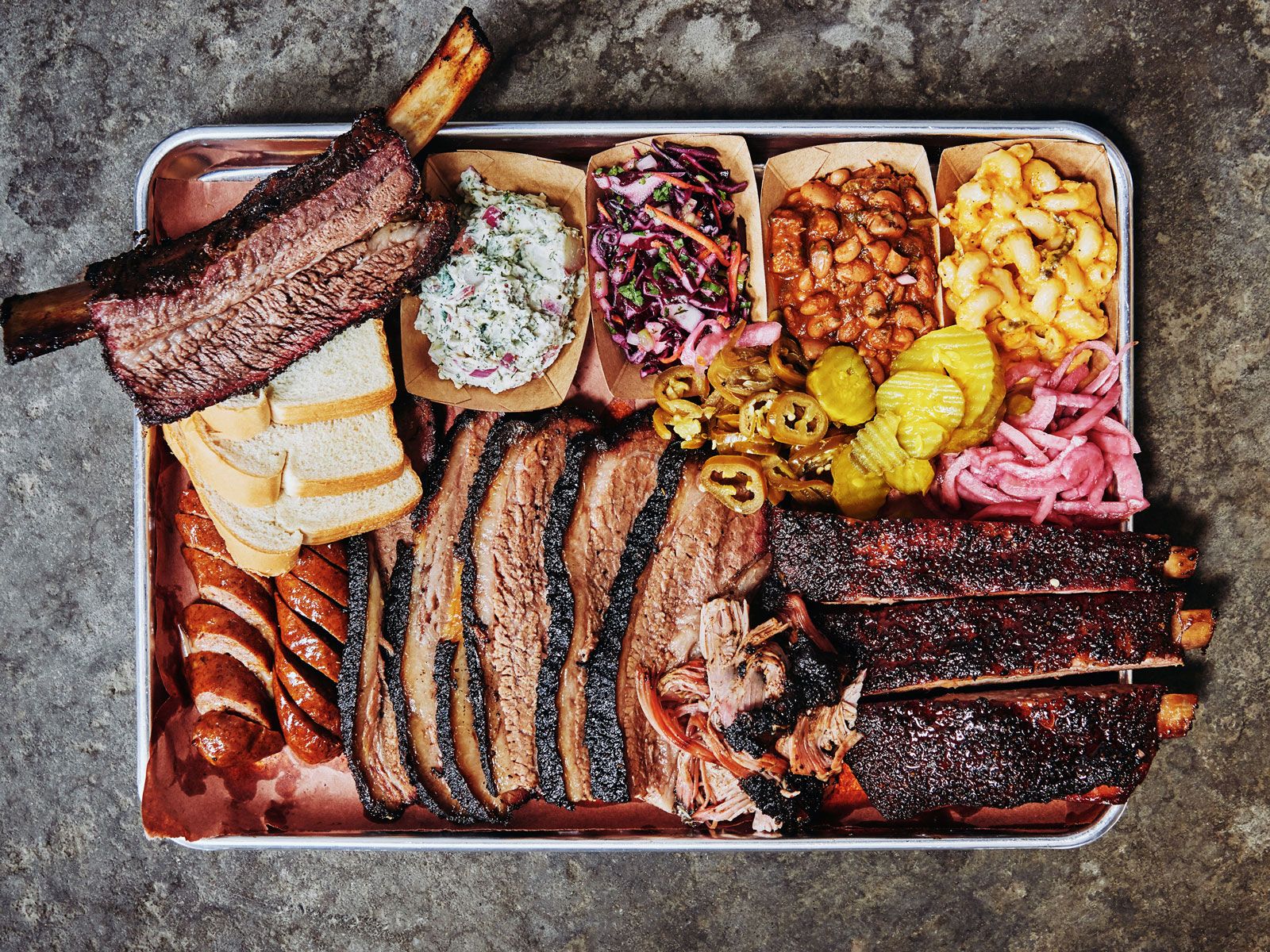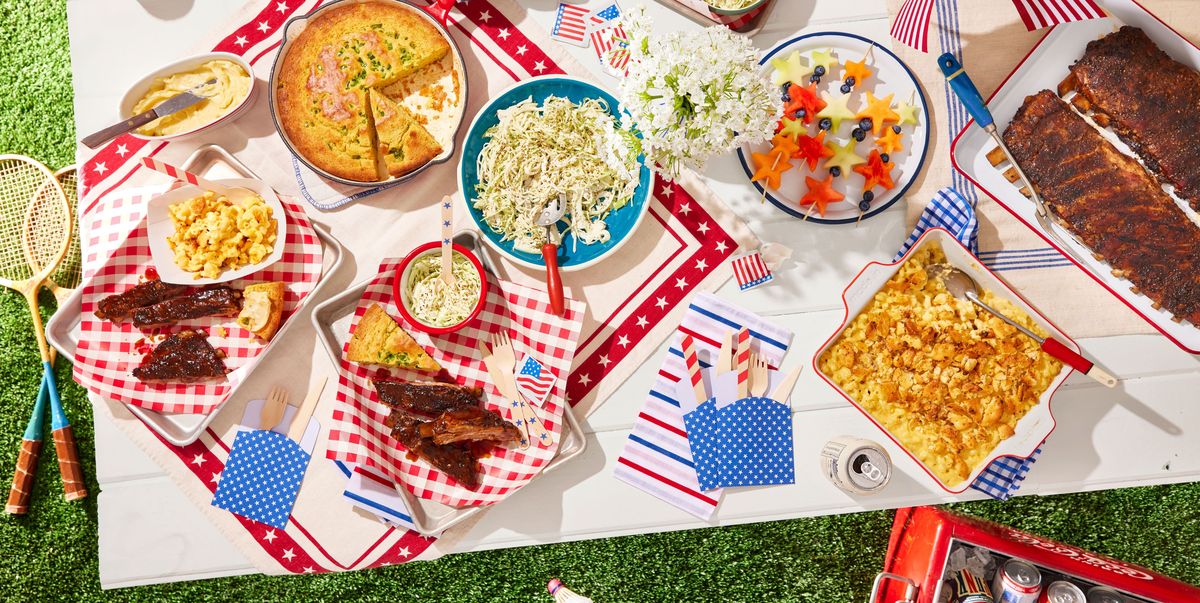

Articles
What Does BBQ Mean
Modified: August 28, 2024
Discover the true meaning of BBQ and get expert insights with our collection of articles on this beloved culinary tradition.
(Many of the links in this article redirect to a specific reviewed product. Your purchase of these products through affiliate links helps to generate commission for Storables.com, at no extra cost. Learn more)
Introduction
Barbecue, commonly referred to as BBQ, is more than just a method of cooking meat. It is ingrained in the fabric of cultures around the world, evoking a sense of community, celebration, and mouth-watering flavors. Whether it’s the smokey aroma wafting through the air or the satisfaction of sinking your teeth into perfectly grilled meat, BBQ has a way of bringing people together.
But what exactly does BBQ mean? It’s a term that has different interpretations and variations depending on where you are in the world. In this article, we’ll explore the origins of BBQ, its regional variations, the types of BBQ, the equipment and techniques used in BBQ, its connection to social gatherings, and even its health implications.
So grab your favorite BBQ sauce and get ready to dive into the world of BBQ!
Key Takeaways:
- BBQ is a global culinary phenomenon with diverse regional variations, each reflecting unique flavors, cooking techniques, and cultural traditions, making it a unifying force that transcends borders and brings people together through the love of good food.
- While indulging in the deliciousness of BBQ, it’s important to be mindful of health implications. Balancing portion sizes, choosing leaner meats, incorporating grilled vegetables, and opting for healthier sides can help create a well-rounded and nutritious BBQ experience.
Read more: What Does Faucet Mean
Origins of BBQ
The origins of BBQ are deeply rooted in ancient cooking techniques. The practice of smoking and slow-cooking meats over an open flame can be traced back thousands of years to various civilizations. One of the earliest records of BBQ-like cooking dates back to the Arawak people of the Caribbean, who would smoke and dry meat over a wooden rack called a boucan. This cooking method gave rise to the term “boucanier,” later anglicized as “buccaneer.”
Similarly, the indigenous tribes of North America had their own form of BBQ, using wooden frames to skewer and roast wild game over a fire pit. This method, known as “barbacoa,” eventually made its way to the Spanish language and became the foundation for the modern word “barbecue.”
As European explorers set sail for new lands, they encountered these indigenous cooking techniques. They brought back samples of smoked and cooked meat to introduce the concept to their own cultures. This exchange of culinary practices laid the groundwork for the global popularity of BBQ.
However, it was in the southern United States where BBQ truly flourished. The Trans-Atlantic slave trade brought thousands of West Africans to the Americas, and with them came their own traditions of slow-cooking meat over open flames. These enslaved individuals adapted their cooking methods to locally available ingredients, resulting in the emergence of unique BBQ styles, such as Carolina-style pulled pork and Texas-style beef ribs.
Today, the roots of BBQ can be seen in various cuisines worldwide, from the smoky flavors of South American asado to the tender barbecued meats of Japan’s yakiniku. Each culture has put its own spin on BBQ, incorporating local ingredients, spices, and cooking techniques.
The evolution of BBQ over time has seen it transcend borders and become a culinary phenomenon, beloved by people from all walks of life.
Regional Variations of BBQ
BBQ is not a one-size-fits-all concept. It has evolved differently in various regions around the world, showcasing unique flavors, cooking techniques, and meat preferences. Let’s take a journey through some of the most renowned regional variations of BBQ:
1. American BBQ:
American BBQ is a melting pot of styles, each with its own distinct character. In the southern states, you’ll find the smoky and tangy flavors of Carolina-style BBQ, known for their pulled pork and vinegar-based sauces. Moving towards Texas, you’ll encounter the emphasis on beef, with mouthwatering brisket and thick, tomato-based sauces. Kansas City BBQ boasts sweet and spicy flavors, using a molasses-based sauce on ribs and burnt ends. The diversity of American BBQ is a testament to the country’s rich culinary history.
2. Argentine Asado:
In Argentina, BBQ is more than just a meal; it’s a way of life. The centerpiece of Argentine cuisine is the asado, a social event centered around grilling various cuts of beef over hot coals. The meat is seasoned simply with salt and cooked slowly to perfection, resulting in tender, flavorful steaks and sausages. Argentine asado showcases the country’s passion for high-quality meat and communal dining.
Read more: What Does Chandelier Mean
3. Korean BBQ:
Korean BBQ, or “gogi-gui,” is a popular dining experience where diners grill their own meat at the table. Thinly sliced marinated beef (bulgogi) and pork (samgyeopsal) are grilled over a charcoal or gas grill, creating a delicious smoky flavor. The meat is typically wrapped in lettuce leaves with various condiments and enjoyed as a flavorful and interactive meal.
4. South African Braai:
In South Africa, the Braai is more than a cooking method; it’s a symbol of unity and celebration. Traditional Braai involves grilling meat, but it extends beyond that to include a variety of dishes like boerewors (sausage), sosaties (kebabs), and even vegetables. The social aspect of gathering around the fire and sharing food is integral to the South African Braai culture.
5. Japanese Yakiniku:
Yakiniku, meaning “grilled meat,” is a popular style of BBQ in Japan. Thinly sliced beef, pork, or chicken is grilled at the table over a charcoal or gas grill. The meat is typically marinated or seasoned with sauces like soy-based tare. Yakiniku often incorporates a variety of offal and unique cuts, highlighting the Japanese approach of utilizing the whole animal.
These examples only scratch the surface of the vast array of regional BBQ styles that can be found worldwide. Each variation reflects the local culture, ingredients, and culinary traditions, offering a diverse and flavorful experience for BBQ enthusiasts around the globe.
Types of BBQ
When it comes to BBQ, there are different types that go beyond regional variations. These types highlight various cooking techniques, flavors, and meats. Let’s explore some of the most popular types of BBQ:
Read more: What To Serve With BBQ
1. Smoking:
Smoking is a slow-cooking method that involves cooking meat over indirect heat and using wood chips or chunks to create smoke. This process infuses the meat with a distinct smoky flavor. Common types of wood used for smoking include hickory, mesquite, applewood, and cherry. Smoking is ideal for large cuts of meat like brisket, pulled pork, and ribs.
2. Grilling:
Grilling is a quicker cooking method that involves cooking meat directly over high heat. It’s ideal for smaller cuts of meat like steaks, burgers, and chicken breasts. Grilling can be done over charcoal, gas, or electric grills, each providing its own unique flavor profile.
3. Pit Roasting:
Pit roasting is a method that involves cooking meats slowly in a large pit dug into the ground. The pit is typically lined with hot coals and covered with metal sheets or earth, creating an oven-like environment. This technique is commonly used for whole animals, such as pigs or lambs, and results in tender, succulent meat.
4. Rotisserie:
Using a rotisserie involves skewering meat on a rotating spit and cooking it over a heat source. This method ensures even cooking and creates deliciously crispy skin on poultry and a juicy, evenly cooked interior. Rotisserie cooking is commonly used for whole chickens, turkeys, and even large cuts of beef.
Read more: What Does Fertilizer Mean
5. Sous Vide BBQ:
Sous vide BBQ combines the precise temperature control of sous vide cooking with the flavors of BBQ. The meat is vacuum-sealed in a bag with marinades or seasonings and cooked in a water bath at a precise temperature for a long period. Once cooked, the meat is finished by searing on a grill or in a hot pan to achieve the desired char and smoky flavor.
These are just a few examples of BBQ methods, each offering unique flavors and cooking experiences. Ultimately, the type of BBQ you choose depends on your preferred cooking style and the flavors you want to achieve.
BBQ Equipment and Techniques
To achieve the perfect BBQ, having the right equipment and employing various techniques is essential. Let’s delve into some of the common BBQ equipment and techniques used to create mouthwatering results:
1. BBQ Grill:
A BBQ grill is the foundation of any BBQ setup. Whether you opt for a charcoal grill, gas grill, pellet grill, or electric grill, each has its own advantages. Charcoal grills provide a distinct smoky flavor, gas grills offer convenience and quick heat-up times, pellet grills provide consistent temperature control, and electric grills are suitable for indoor BBQing. Choose the grill that suits your preferences and cooking style.
2. Fire Management:
Mastering fire management is crucial for BBQ success. Controlling the temperature of your grill or smoker ensures even cooking and prevents the meat from becoming overcooked or undercooked. Understanding how to adjust the airflow, using vents and dampers, and managing the fuel source (charcoal, wood, or pellets) are key aspects of fire management.
Read more: What Does “Facade” Mean
3. Marinating and Rubs:
Marinating and using rubs are common techniques for enhancing the flavor of the meat. Marinades typically consist of a combination of acidic ingredients (such as citrus juice or vinegar), oil, herbs, spices, and seasonings. Rubs are dry mixtures of spices, herbs, salt, and sugar that are applied directly onto the meat. Both techniques add flavor and tenderize the meat, enhancing the BBQ experience.
4. Slow and Low Cooking:
One of the defining features of BBQ is the slow and low cooking method. Low temperatures and longer cooking times allow the collagen in the meat to break down, resulting in tender, juicy, and full-flavored meat. This technique is typically used for larger cuts of meat like brisket, ribs, and pork shoulders.
5. Smoking Wood Selection:
The choice of wood for smoking can greatly influence the flavor profile of your BBQ. Different types of wood impart distinct aromas and flavors to the meat. Popular smoking woods include hickory, mesquite, apple, cherry, and oak. Experimenting with different wood varieties can open up a world of flavor possibilities.
By utilizing the right equipment and employing various techniques, you can elevate your BBQ game and create unforgettable flavors that will impress family and friends.
BBQ and Social Gatherings
BBQ and social gatherings go hand in hand, as the act of cooking and sharing a delicious meal brings people together in a unique and festive atmosphere. Here’s how BBQ fosters camaraderie and adds a special touch to social gatherings:
Read more: What Does “Renovation” Mean
1. Community Bonding:
BBQ has a way of uniting communities and creating bonds among friends, family, and neighbors. Whether it’s a backyard cookout, a neighborhood BBQ party, or a potluck gathering, the act of coming together to enjoy grilled meats and tasty side dishes creates a sense of togetherness and community spirit.
2. Shared Cooking Experience:
BBQ often involves a collaborative cooking experience, with everyone contributing to the preparation and cooking process. From marinating the meat to tending the grill, there’s something inherently enjoyable about working as a team to create a delicious meal. This shared cooking experience strengthens relationships and allows for shared memories and laughter.
3. Food as a Conversation Starter:
Food has a way of breaking down barriers and acting as a conversation starter. BBQ, with its mouthwatering aromas and flavors, naturally creates a lively environment where people gather to discuss their experiences, share recipes and grilling tips, and engage in passionate discussions about the best BBQ techniques.
4. Outdoor Celebrations and Festivals:
BBQ is often associated with outdoor celebrations and festivals. From Fourth of July barbecues to backyard parties, BBQ brings a festive vibe to any occasion. It’s a chance to enjoy the great outdoors, soak up the sunshine, and indulge in grilled delights while celebrating special moments with loved ones.
Read more: What To Bring To BBQ Potluck
5. Informal and Relaxed Atmosphere:
One of the beauties of BBQ is its informal and relaxed nature. Unlike formal dinners, BBQ gatherings often allow for a more laid-back atmosphere, where people can kick back, enjoy good food, and connect on a deeper level. It’s an opportunity to unwind, have fun, and create lasting memories in a casual setting.
Whether it’s a small gathering or a large-scale event, BBQ has the power to create a warm and inviting atmosphere, where people can connect, forge friendships, and celebrate together. It brings joy, laughter, and a sense of unity that is hard to replicate in any other type of social gathering.
Health Implications of BBQ
While BBQ is undeniably delicious, it’s important to be mindful of the health implications that come with indulging in this flavorful cooking style. Here are some considerations to keep in mind for a balanced and healthy approach to BBQ:
1. Cooking Methods and Temperature:
The cooking methods used in BBQ, such as grilling or smoking, can lead to the formation of potentially harmful compounds. For example, when meat is grilled over high heat or exposed to open flames, it can create charred or burnt areas that contain heterocyclic amines (HCAs) and polycyclic aromatic hydrocarbons (PAHs), which are known carcinogens. To reduce the formation of these compounds, consider marinating the meat, using indirect cooking methods, and avoiding excessive charring.
2. Portion Sizes and Caloric Intake:
BBQ often features large portions of meat, which can contribute to increased calorie intake. It’s important to balance the consumption of BBQ meats with ample servings of vegetables, salads, and lighter side dishes to ensure a well-rounded meal. Additionally, be mindful of portion sizes and listen to your body’s signals of fullness to avoid overeating.
3. Choice of Meats:
The type of meat used in BBQ can impact its health implications. Processed meats, such as sausages, hot dogs, and bacon, are often high in sodium and may contain nitrates or nitrites, which have been associated with an increased risk of certain cancers. Opting for leaner cuts of meat, like chicken breast or fish, and incorporating plant-based proteins, such as vegetables or tofu, can provide a healthier alternative while still enjoying the flavors of BBQ.
4. Sauces and Marinades:
Many BBQ sauces and marinades contain added sugars and high amounts of sodium. While they add flavor, excessive consumption of these condiments can contribute to health issues such as obesity, high blood pressure, and cardiovascular disease. Consider making your own homemade sauces with reduced sugar and sodium content, or choose low-sugar, low-sodium options available in the market.
5. Grilled Vegetables and Healthier Sides:
Expanding the BBQ menu beyond just meats can help incorporate healthier options into the meal. Grilling vegetables not only adds a smoky flavor but also provides essential nutrients and fiber. Additionally, incorporating whole grains, salads, and lighter side dishes can enhance the overall nutritional value of the BBQ meal.
By being mindful of these health considerations, it’s possible to enjoy BBQ while maintaining a balanced and nutritious diet. Moderation, varied food choices, and conscious cooking methods can help mitigate any potential health risks associated with BBQ, allowing you to savor the experience without compromising your well-being.
Conclusion
BBQ is not just a method of cooking; it’s a cultural phenomenon that brings people together, tantalizes taste buds, and creates lasting memories. From its humble origins to the diverse regional variations, BBQ has a way of capturing the hearts and palates of people around the world.
Exploring the world of BBQ reveals a rich tapestry of flavors, techniques, and social customs. Whether it’s the sizzling grill, the wafting smoke, or the succulent meat cooked to perfection, BBQ has a way of igniting our senses and connecting us to our primal roots.
But as with any culinary indulgence, it’s important to approach BBQ with moderation and a mindful eye on health implications. Balancing portion sizes and opting for leaner meats, paired with a colorful array of grilled vegetables and healthier sides, can help create a well-rounded and nutritious BBQ experience.
Above all, BBQ is a celebration of gathering and camaraderie. It fosters community bonds, sparks conversations, and creates an informal and relaxed atmosphere where cherished memories are made. Whether it’s a casual backyard cookout, a festive holiday gathering, or a cultural festival, BBQ has a unique way of bringing people together, connecting us through the shared enjoyment of good food and good company.
So the next time you fire up the grill, take a moment to appreciate the centuries-old traditions, the diverse flavors, and the joy that BBQ brings. Let the tantalizing aromas and delicious flavors transport you to a place of connection and culinary delight. Whether you’re a BBQ aficionado or a casual backyard griller, BBQ is an experience worth savoring.
So gather your friends and family, stoke the coals, and let the smoky flavors and good times roll. From the origins of BBQ to the plethora of regional variations, BBQ is a cultural, gastronomic, and social phenomenon that will continue to captivate our taste buds and bring people together for generations to come.
Frequently Asked Questions about What Does BBQ Mean
Was this page helpful?
At Storables.com, we guarantee accurate and reliable information. Our content, validated by Expert Board Contributors, is crafted following stringent Editorial Policies. We're committed to providing you with well-researched, expert-backed insights for all your informational needs.









0 thoughts on “What Does BBQ Mean”